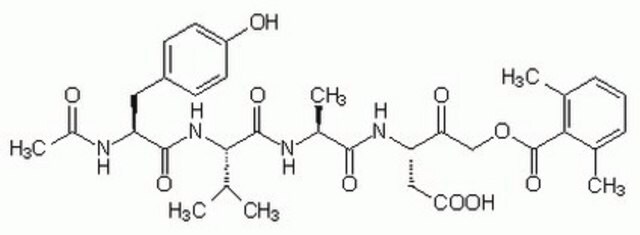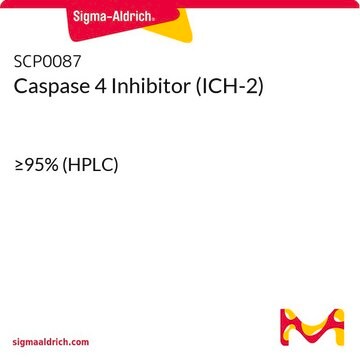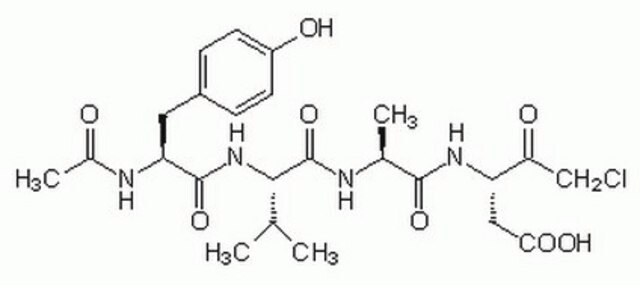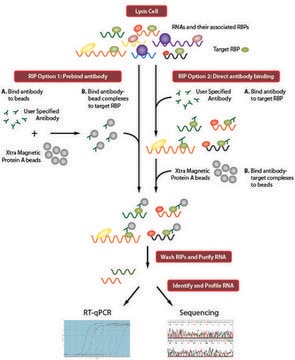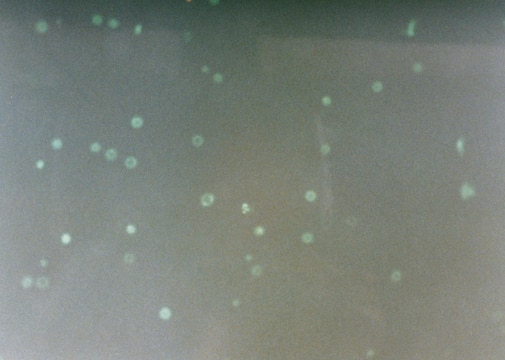218755
Caspase-4 Inhibitor I
The Caspase-4 Inhibitor I, also referenced under CAS 402832-01-3, controls the biological activity of Caspase-4. This small molecule/inhibitor is primarily used for Cancer applications.
Synonym(s):
Caspase-4 Inhibitor I, Ac-LEVD-CHO
Sign Into View Organizational & Contract Pricing
All Photos(1)
About This Item
Empirical Formula (Hill Notation):
C22H36N4O9
CAS Number:
Molecular Weight:
500.54
UNSPSC Code:
12352200
NACRES:
NA.54
Recommended Products
Quality Level
Assay
≥95% (HPLC)
form
lyophilized solid
manufacturer/tradename
Calbiochem®
storage condition
OK to freeze
color
white
solubility
water: 1 mg/mL
shipped in
ambient
storage temp.
−20°C
General description
A reversible caspase-4 (ICH-2) inhibitor.
A reversible caspase-4 inhibitor.
Biochem/physiol Actions
Cell permeable: no
Primary Target
caspase-4
caspase-4
Product does not compete with ATP.
Reversible: yes
Warning
Toxicity: Standard Handling (A)
Sequence
Ac-Leu-Glu-Val-Asp-CHO
Reconstitution
Following reconstitution aliquot and freeze (-20°C). Stock solutions are stable for up to 3 months at -20°C.
Other Notes
Thornberry, N.A., and Lazebnik, Y. 1998. Science 281, 1312.
Talanian, R.V., et al. 1997. J. Biol. Chem. 272, 9677.
Talanian, R.V., et al. 1997. J. Biol. Chem. 272, 9677.
Legal Information
CALBIOCHEM is a registered trademark of Merck KGaA, Darmstadt, Germany
Storage Class Code
11 - Combustible Solids
WGK
WGK 1
Flash Point(F)
Not applicable
Flash Point(C)
Not applicable
Certificates of Analysis (COA)
Search for Certificates of Analysis (COA) by entering the products Lot/Batch Number. Lot and Batch Numbers can be found on a product’s label following the words ‘Lot’ or ‘Batch’.
Already Own This Product?
Find documentation for the products that you have recently purchased in the Document Library.
Zahara L Chaudhry et al.
Brain sciences, 12(4) (2022-04-22)
The outbreak of COVID-19 caused by severe acute respiratory syndrome coronavirus 2 (SARS-CoV-2) signifies a serious worldwide concern to public health. Both transcriptome and proteome of SARS-CoV-2-infected cells synergize the progression of infection in host, which may exacerbate symptoms and/or
Jian Zhang et al.
Science immunology, 7(68), eabk2092-eabk2092 (2022-02-05)
Goblet cells and their main secretory product, mucus, play crucial roles in orchestrating the colonic host-microbe interactions that help maintain gut homeostasis. However, the precise intracellular machinery underlying this goblet cell-induced mucus secretion remains poorly understood. Gasdermin D (GSDMD) is
Our team of scientists has experience in all areas of research including Life Science, Material Science, Chemical Synthesis, Chromatography, Analytical and many others.
Contact Technical Service